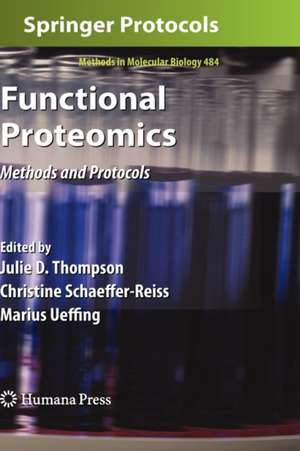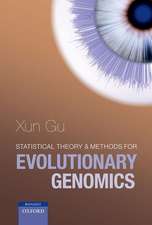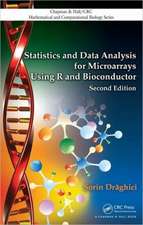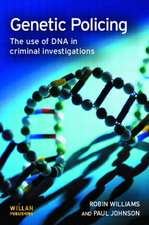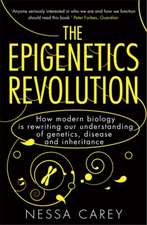Functional Proteomics: Methods and Protocols: Methods in Molecular Biology, cartea 484
Editat de Julie D. Thompson, Christine Schaeffer-Reiss, Marius Ueffingen Limba Engleză Hardback – 12 aug 2008
Comprehensive and cutting-edge, Functional Proteomics: Methods and Protocols is an ideal resource for all scientists pursuing this developing field and its multitudinous data.
| Toate formatele și edițiile | Preț | Express |
|---|---|---|
| Paperback (1) | 809.40 lei 38-44 zile | |
| Humana Press Inc. – 16 dec 2010 | 809.40 lei 38-44 zile | |
| Hardback (1) | 963.91 lei 6-8 săpt. | |
| Humana Press Inc. – 12 aug 2008 | 963.91 lei 6-8 săpt. |
Din seria Methods in Molecular Biology
- 9%
 Preț: 791.63 lei
Preț: 791.63 lei - 23%
 Preț: 598.58 lei
Preț: 598.58 lei - 20%
 Preț: 882.98 lei
Preț: 882.98 lei -
 Preț: 252.05 lei
Preț: 252.05 lei - 5%
 Preț: 802.70 lei
Preț: 802.70 lei - 5%
 Preț: 729.61 lei
Preț: 729.61 lei - 5%
 Preț: 731.43 lei
Preț: 731.43 lei - 5%
 Preț: 741.30 lei
Preț: 741.30 lei - 5%
 Preț: 747.16 lei
Preț: 747.16 lei - 15%
 Preț: 663.45 lei
Preț: 663.45 lei - 18%
 Preț: 1025.34 lei
Preț: 1025.34 lei - 5%
 Preț: 734.57 lei
Preț: 734.57 lei - 18%
 Preț: 914.20 lei
Preț: 914.20 lei - 15%
 Preț: 664.61 lei
Preț: 664.61 lei - 15%
 Preț: 654.12 lei
Preț: 654.12 lei - 18%
 Preț: 1414.74 lei
Preț: 1414.74 lei - 5%
 Preț: 742.60 lei
Preț: 742.60 lei - 20%
 Preț: 821.65 lei
Preț: 821.65 lei - 18%
 Preț: 972.30 lei
Preț: 972.30 lei - 15%
 Preț: 660.49 lei
Preț: 660.49 lei - 5%
 Preț: 738.41 lei
Preț: 738.41 lei - 18%
 Preț: 984.92 lei
Preț: 984.92 lei - 5%
 Preț: 733.29 lei
Preț: 733.29 lei -
 Preț: 392.60 lei
Preț: 392.60 lei - 5%
 Preț: 746.26 lei
Preț: 746.26 lei - 18%
 Preț: 962.66 lei
Preț: 962.66 lei - 23%
 Preț: 860.22 lei
Preț: 860.22 lei - 15%
 Preț: 652.64 lei
Preț: 652.64 lei - 5%
 Preț: 1055.50 lei
Preț: 1055.50 lei - 23%
 Preț: 883.87 lei
Preț: 883.87 lei - 5%
 Preț: 1141.13 lei
Preț: 1141.13 lei - 19%
 Preț: 491.89 lei
Preț: 491.89 lei - 5%
 Preț: 1038.86 lei
Preț: 1038.86 lei - 5%
 Preț: 524.16 lei
Preț: 524.16 lei - 18%
 Preț: 2122.34 lei
Preț: 2122.34 lei - 5%
 Preț: 1299.23 lei
Preț: 1299.23 lei - 5%
 Preț: 1339.12 lei
Preț: 1339.12 lei - 18%
 Preț: 1390.26 lei
Preț: 1390.26 lei - 18%
 Preț: 1395.63 lei
Preț: 1395.63 lei - 18%
 Preț: 1129.65 lei
Preț: 1129.65 lei - 18%
 Preț: 1408.26 lei
Preț: 1408.26 lei - 18%
 Preț: 1124.92 lei
Preț: 1124.92 lei - 18%
 Preț: 966.27 lei
Preț: 966.27 lei - 5%
 Preț: 1299.99 lei
Preț: 1299.99 lei - 5%
 Preț: 1108.51 lei
Preț: 1108.51 lei - 5%
 Preț: 983.76 lei
Preț: 983.76 lei - 5%
 Preț: 728.16 lei
Preț: 728.16 lei - 18%
 Preț: 1118.62 lei
Preț: 1118.62 lei - 18%
 Preț: 955.25 lei
Preț: 955.25 lei - 5%
 Preț: 1035.62 lei
Preț: 1035.62 lei
Preț: 963.91 lei
Preț vechi: 1175.51 lei
-18% Nou
Puncte Express: 1446
Preț estimativ în valută:
184.44€ • 200.98$ • 155.42£
184.44€ • 200.98$ • 155.42£
Carte tipărită la comandă
Livrare economică 23 aprilie-07 mai
Preluare comenzi: 021 569.72.76
Specificații
ISBN-13: 9781588299710
ISBN-10: 1588299716
Pagini: 595
Ilustrații: XVIII, 596 p. 115 illus., 4 illus. in color.
Dimensiuni: 155 x 235 x 33 mm
Greutate: 0.98 kg
Ediția:2008
Editura: Humana Press Inc.
Colecția Humana
Seria Methods in Molecular Biology
Locul publicării:Totowa, NJ, United States
ISBN-10: 1588299716
Pagini: 595
Ilustrații: XVIII, 596 p. 115 illus., 4 illus. in color.
Dimensiuni: 155 x 235 x 33 mm
Greutate: 0.98 kg
Ediția:2008
Editura: Humana Press Inc.
Colecția Humana
Seria Methods in Molecular Biology
Locul publicării:Totowa, NJ, United States
Public țintă
ResearchCuprins
A Brief Summary of the Different Types of Mass Spectrometers Used in Proteomics.- Experimental Setups and Considerations to Study Microbial Interactions.- Proteomics.- Plant Proteomics.- Methods for Human CD8+ T Lymphocyte Proteome Analysis.- Label-Free Proteomics of Serum.- Flow Cytometric Analysis of Cell Membrane Microparticles.- Protein Expression Profiling.- Exosomes.- Toward a Full Characterization of the Human 20S Proteasome Subunits and Their Isoforms by a Combination of Proteomic Approaches.- Free-Flow Electrophoresis of the Human Urinary Proteome.- Versatile Screening for Binary Protein-Protein Interactions by Yeast Two-Hybrid Mating.- Native Fractionation: Isolation of Native Membrane-Bound Protein Complexes from Porcine Rod Outer Segments Using Isopycnic Density Gradient Centrifugation.- Mapping of Signaling Pathways by Functional Interaction Proteomics.- Selection of Recombinant Antibodies by Eukaryotic Ribosome Display.- Production of Protein Arrays by Cell-Free Systems.- Nondenaturing Mass Spectrometry to Study Noncovalent Protein/Protein and Protein/Ligand Complexes: Technical Aspects and Application to the Determination of Binding Stoichiometries.- Protein Processing Characterized by a Gel-Free Proteomics Approach.- Identification and Characterization of N-Glycosylated Proteins Using Proteomics.- Protein Analysis.- Data Standards and Controlled Vocabularies for Proteomics.- The PRIDE Proteomics Identifications Database: Data Submission, Query, and Dataset Comparison.- Searching the Protein Interaction Space Through the MINT Database.- PepSeeker: Mining Information from Proteomic Data.- Toward High-Throughput and Reliable Peptide Identification via MS/MS Spectra.- MassSorter: Peptide Mass Fingerprinting Data Analysis.- Database Similarity Searches.- Protein Multiple Sequence Alignment.- Discovering Biomedical Knowledge from the Literature.- Protein Subcellular Localization Prediction Using Artificial Intelligence Technology.- Protein Functional Annotation by Homology.- Designability and Disease.- Prism: Protein-Protein Interaction Prediction by Structural Matching.- Prediction of Protein Interaction Based on Similarity of Phylogenetic Trees.- Large Multiprotein Structures Modeling and Simulation: The Need for Mesoscopic Models.- Dynamic Pathway Modeling of Signal Transduction Networks: A Domain-Oriented Approach.
Recenzii
From the reviews:“The new book, Functional Proteomics, Methods and Protocols … is the perfect guide to securely navigating through the plethora of recent as well as established proteomic technologies. … In summary, I highly recommend this book as an excellent source for gaining insight into a diverse array of the latest proteomic protocols … . suitable for everyone working in the field of proteomics, including chemists, biologists, analytical chemists, and biochemists at different career stages, from students to the trained and experienced scientist.” (Stephan A. Sieber, ChemBioChem, Vol. 10 (18), 2009)“Book presents a collection of methods about correct techniques to identify, monitor, quantify, and explain protein and peptide function. … present different types of mass spectrometers and their uses, allowing the reader to choose the most useful technique for a specific purpose. … The strategy behind metabolomic studies is well described in this book. … The book concludes with the indispensable application of bioinformatics in the understanding of regulatory and protein systems which are influenced by the environment.” (Mario Hiroyuki Hirata, Brazilian Journal of Pharmaceutical Sciences, 2010)“The field of proteomics continues to develop rapidly and its main focus has now moved from increasing capacity for protein identification to quantification and the analysis of post-translational modifications. … this volume attempts to provide detail regarding some of the latest approaches being used. … will be of use to many PhD students and postdoctoral scientists … . a well-written and informative book, and one which would be useful to have in any proteomics lab … .” (Lucas Bowler, Microbiology Today, August, 2010)
Textul de pe ultima copertă
As the emerging field of proteomics continues to expand at an extremely rapid rate, the relative quantification of proteins, targeted by their function, becomes its greatest challenge. Complex analytical strategies have been designed that allow comparative analysis of large proteomes, as well as in depth detection of the core proteome or the interaction network of a given protein of interest. In Functional Proteomics: Methods and Protocols, expert researchers describe the latest protocols being developed to address the problems encountered in high-throughput proteomics projects, with emphasis on the factors governing the technical choices for given applications. The case studies within the volume focus on the following three crucial aspects of the experimental design: 1) the strategy used for the selection, purification and preparation of the sample to be analyzed by mass spectrometry, 2) the type of mass spectrometer used and the type of data to be obtained from it, and 3) the method used for the interpretation of the mass spectrometry data and the search engine used for the identification of the proteins in the different types of sequence data banks available. As a part of the highly successful Methods in Molecular Biology™ series, the chapters compile step-by-step, readily reproducible laboratory protocols, lists of the necessary materials and reagents, and tips on troubleshooting and avoiding known pitfalls.
Comprehensive and cutting-edge, Functional Proteomics: Methods and Protocols is an ideal resource for all scientists pursuing this developing field and its multitudinous data.
Comprehensive and cutting-edge, Functional Proteomics: Methods and Protocols is an ideal resource for all scientists pursuing this developing field and its multitudinous data.
Caracteristici
Unique combination of reproducible laboratory protocols and state-of-the-art bioinformatics methods dedicated to functional proteomics A comprehensive methodological compendium, covering sample preparation, protein separation, mass-spectrometry as well as data mining, documentation and integration Offers methods, workflows and strategies to overcome current pitfalls and shortcomings in proteome analysis
